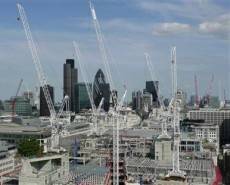August 21, 2014
Hotels allocating more public space to meet the needs of business travellers
 Presenteeism isn’t restricted to the workplace. Growing demand from business travellers means hotels are increasing the amount of working and meeting space they provide in their facilities in cities across Europe and the rest of the world. Three quarters of British employees work while staying in a hotel according to the survey carried out by the Fraunhofer Institute on behalf of hotel business solutions firm HRS. Only Italians spend more time working in hotels (76 percent), followed the UK (75 percent), Poland and Switzerland (50 percent respectively), Germany (46 percent), China (45 percent), Russia (43 percent), Austria (42 percent) and France (25 percent). The firm has also identified a number of hotels around the world which it believes offers exemplars of the new working spaces available.
Presenteeism isn’t restricted to the workplace. Growing demand from business travellers means hotels are increasing the amount of working and meeting space they provide in their facilities in cities across Europe and the rest of the world. Three quarters of British employees work while staying in a hotel according to the survey carried out by the Fraunhofer Institute on behalf of hotel business solutions firm HRS. Only Italians spend more time working in hotels (76 percent), followed the UK (75 percent), Poland and Switzerland (50 percent respectively), Germany (46 percent), China (45 percent), Russia (43 percent), Austria (42 percent) and France (25 percent). The firm has also identified a number of hotels around the world which it believes offers exemplars of the new working spaces available.





 The UK’s snail-paced broadband infrastructure isn’t up to the demands placed on it by 21st century businesses and there is not enough ambition to bring it up to speed with that of other nations, according to a new report from the Federation of Small Businesses. The report found that while nearly all small business owners (94 percent) consider a reliable internet connection essential, just 15 percent are happy with their provision and a staggering 45,000 small businesses are still dependant on a dial-up connection and many more are struggling by with slow broadband speeds under 2 Megabits per second (Mbps). The FSB also claims that current Government targets of 24Mbps for 95 per cent of the population and 2Mbps for the remaining five per cent will not meet future demands and that it should commit to delivering a minimum of 10Mbps (megabits per second) for all homes and businesses by 2017 rising to 1Gbps (gigabit per second) by 2030.
The UK’s snail-paced broadband infrastructure isn’t up to the demands placed on it by 21st century businesses and there is not enough ambition to bring it up to speed with that of other nations, according to a new report from the Federation of Small Businesses. The report found that while nearly all small business owners (94 percent) consider a reliable internet connection essential, just 15 percent are happy with their provision and a staggering 45,000 small businesses are still dependant on a dial-up connection and many more are struggling by with slow broadband speeds under 2 Megabits per second (Mbps). The FSB also claims that current Government targets of 24Mbps for 95 per cent of the population and 2Mbps for the remaining five per cent will not meet future demands and that it should commit to delivering a minimum of 10Mbps (megabits per second) for all homes and businesses by 2017 rising to 1Gbps (gigabit per second) by 2030.





















July 14, 2014
How Arthur C Clarke and other writers predicted tablet computing and the iPad
by Mark Eltringham • Comment, Technology
More →